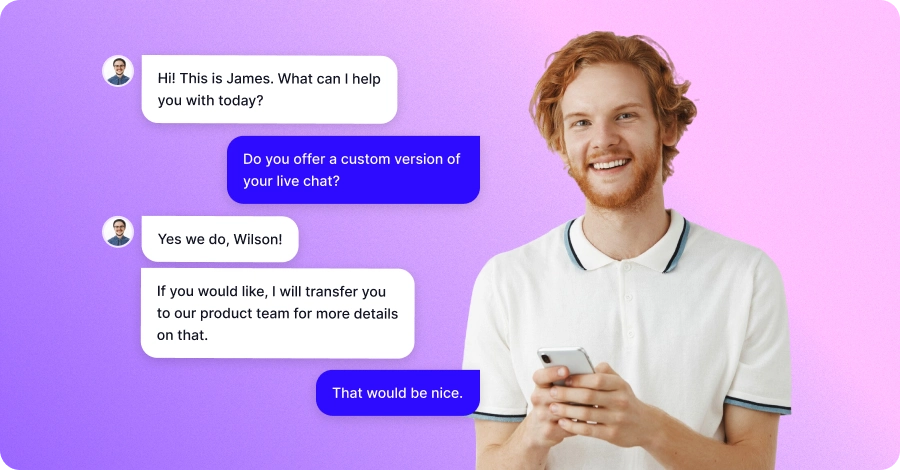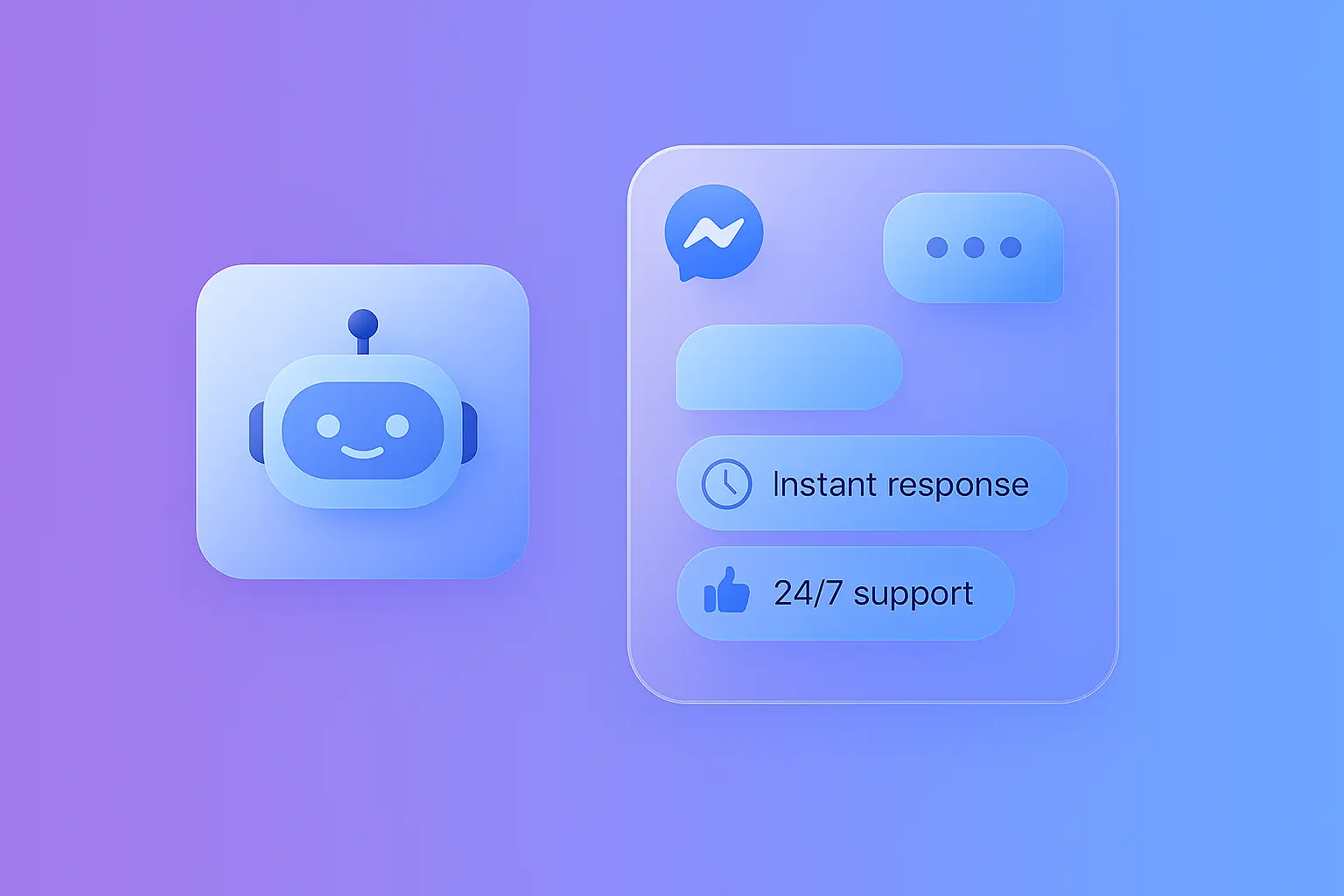15 Best Instant Messaging Platforms for Businesses in 2025
- September 5, 2024
- 24 mins read
- Listen

Customers expect instant response. In your business, if you can’t offer real-time communication, chances are high that customers will leave being dissatisfied. The traditional communication channels like emails and phone calls often lack the immediacy that your customers expect, especially in an age where instant responses have become the norm. The result? Frustration, inefficiency, missed opportunities, and disjointed internal operations.
This is where integrating instant messaging (IM) platforms can become the game changer. With real-time interactions, businesses can respond promptly to customer inquiries, collaborate seamlessly across different teams, and foster deeper customer engagement.
If you are still not using instant messaging for your business, you are definitely losing something. Below are some statistics that will show you the importance of IM.
- According to Facebook, 66% of consumers feel more confident about making a purchase when a company is active on messaging apps.
- eMarketer reports, the number of messaging app users worldwide is projected to reach 3.55 billion in 2024, a 6.1% increase from 2023.
In this blog, you will find everything you need to know about instant messaging platforms. I have listed down the 15 best instant messaging apps for businesses to choose from, their benefits, basic features, and use cases. So keep reading this space to know more.
What is an Instant Messaging (IM) Platform?
‘An Instant Messaging tool is a software application that enables real-time communication between individuals or groups of people.’
From project collaborations to casual team communications and customer engagement, This IM software has fundamentally changed the way businesses operate. IM is highly beneficial for customer communication, team management, and many business operations, including customer service.
Instant messaging offers several advanced features like file sharing, voice and video calls, and the ability to check when contacts are online. In the upcoming section, we will discuss more about these features.
Benefits of Instant Messaging Platforms
Messaging apps have become more popular and widely used than social networks. According to the Business Insider’s Report, these apps now have 20% more active monthly users than social networks.
Many of us use social media platforms, but IM apps have become an integral part of our lives, making it almost impossible to opt-out. Consequently, when companies use IM messaging in their business, communicating with this vast customer base becomes much easier.
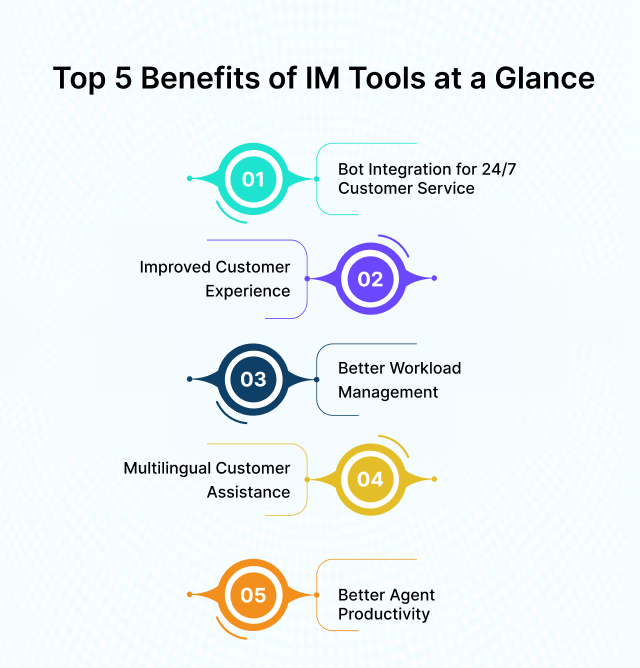
Let’s look into some of the major benefits of using instant messaging solutions in your business:
Bot Integration for 24/7 Customer Service
Business IM solutions offer several important features, such as bot integration and self-service, that enable businesses to provide instant assistance even after business hours. Customers from different geographic locations and time zones may encounter issues at any time, not necessarily within your business hours.
In such cases, chatbots serve as a savior, offering 24/7 real-time customer service. Automated customer service ensures that someone is available to assist your customers even when your support agents are offline.
Improved Customer Experience
Good IM applications seamlessly integrate with your existing communication platforms and offer you detailed information about your customers like their geographic locations, past chat history, etc. Such information helps customer service agents to tailor the communication messages and offer a personalized experience to each of their customers.
Better Workload Management
Many times, support agents need to handle multiple customers at a time but they are also human beings and have limitations. Every customer comes with different problems, and solving their issues takes time. In such a case, AI-powered IM tools come in handy. The chatbot automates many of the business operations including customer service and frees up time for agents to focus on other important works.
With integrated FAQs and other information, chatbots can handle multiple customers at a time 24/7, verify customer info, route queries to the right agent, schedule various appointments, etc to manage the workload in a better way.
Enables Customers to Communicate on Their Preferred Channels
IM platforms easily integrate with many of your business systems. Customers can use their preferred IM platforms, such as Viber, WhatsApp, or Facebook Messenger, to communicate with your business. Your agents can efficiently handle and respond to these queries from a centralized point.
Better Agent Productivity
Many AI-powered IM tools offer important features like canned responses and automation that help agents manage their work in a better way to reply faster to customer queries. Canned responses are pre-set replies to common queries that can be sent to customers whenever needed. Such features allow agents to efficiently manage multiple customers simultaneously.
Faster Resolution of Customer Queries
Instant messaging apps enable businesses to respond to customer queries in real time, significantly reducing waiting times. Unlike traditional communication channels like emails, thorough advanced features like text messaging, live calls or multimedia sharing, IM tools allow agents to interact directly with customers and resolve their problems. This immediacy ensures that customer issues get resolved efficiently, improving better experience from the brand.
More Benefits of IM Tools
- IM tools offer direct messing facilities in real-time to other team members for better work management and exchange of information.
- File sharing capabilities help teams and customers to instantly exchange important information eliminating the waiting time for email response.
- Group chats facilitate team meetings and brainstorming sessions with internal and external employees in a centralized space regardless of their remote locations.
- Strong security features, such as end-to-end encryption, and two-factor authentication ensure that internal communications remain private and secure.
- Most IM apps are available on mobile devices, enabling employees to stay connected and communicate on the go.
Key Features of Instant Messaging Solutions
Instant messaging platforms offer a bag of great live chat features designed to improve your communication, customer engagement, team collaboration and customer service. Let’s explore the major IM features listed below.
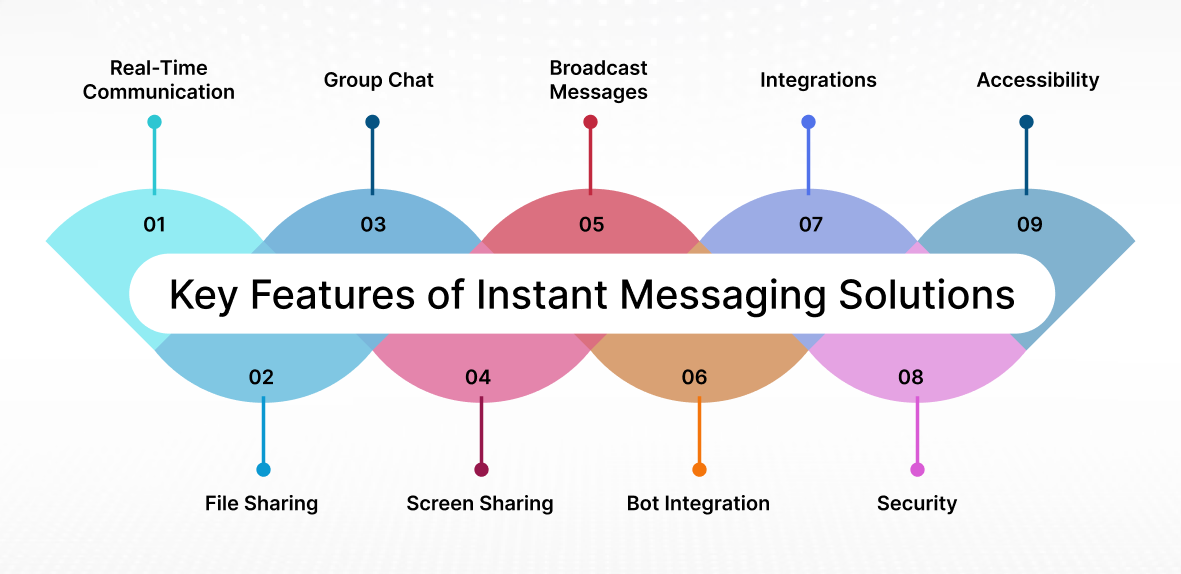
Real-Time Communication
IM facilitates real-time communication through text messages, voice and video calls with your customers and team members.
File Sharing
You can send files in different formats be it images, videos, GIFs, or links to your colleagues, leads, and customers.
Group Chat
It’s a great IM feature where a group of people arrange meetings or other brainstorming sessions in a private secured platform.
Screen Sharing
This feature allows you to share your screen with other group members or individuals on a call, facilitating information sharing. Customer support agents can utilize this capability to resolve customer queries more quickly.
Broadcast Messages
With such features, you can send messages, and updates to a large number of groups at a time. The recipients can react to your message with emojis but cannot reply to you.
Bot Integration
Several IM platforms support bot integration that helps to automate many of your business operations including customer service and allows you to offer 24/7 availability even after your business hours.
Integrations
Instant messaging tools seamlessly connect with your existing CRM, helpdesk, and other business applications and allow you to handle everything from a single interface.
Security
Security and encryption ensure that all your conversations remain private and secure. This feature encrypts messages end-to-end, meaning that only the intended recipients can read the messages. Additionally, two-factor authentication and other regular security updates further safeguard the security and confidentiality of data exchanged on the IM platform.
Accessibility
IM tools are compatible with all devices including desktops, laptops, mobile phones, and tablets. So, both businesses and customers can opt for IM from any of their preferred devices.
How to Choose the Best Instant Messaging Platform for Your Business?
There are numerous instant messaging solutions available for your business. Choosing the right IM app to meet your business requirements involves carefully evaluating several factors. Here are some tips to guide you in making the best choice:
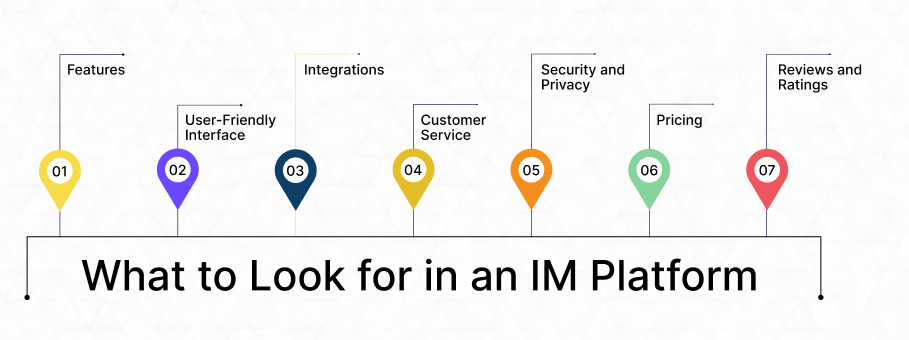
Features
Look for IM apps that offer important features like instant messaging, voice and video calling, file sharing, co-browsing, screen sharing and group chats to enhance communication within your teams and customers.
User-Friendly Interface
Your business instant messaging app should offer a user-friendly interface to manage all the interactions from a single place and manage everything without extensive training.
Integrations
Check if the app integrates with your other business platforms, such as customer engagement software, project management systems, email, and CRM systems.
Customer Service
Consider the IM tools that are useful for both customer service and internal business communication. All-in-one IM apps are always best to pot for.
Security and Privacy
The IM app should also offer robust security features, including end-to-end encryption and two-factor authentication, data protection, and compliance with industry standards.
Pricing
First, determine your main objective for acquiring an IM app. Then, compare the features and pricing structures of various instant messaging business platforms. Shortlist the top two options that meet your business requirements and budget.
Reviews and Ratings
Check for user reviews and ratings on various trustworthy review sites like G2, and Capterra to understand the experiences of other businesses using the same app.
15 Best Instant Messaging Software for Business
Many instant messaging platforms are available for businesses to choose from, but it’s essential to select one that suits your specific needs and objectives. Here are our top 15 picks for the best instant messaging apps to consider. Each of these options is excellent for both external and internal business communication.
1. REVE Chat
REVE Chat is one of the best AI-enabled instant messaging customer engagement software to opt for. It offers IM services on the web, mobile apps, and other social media platforms like Facebook, Instagram, Viber, Telegram, and WhatsApp.
REVE Chat seamlessly integrates with your CRMs, social media channels, and other business platforms to help you manage all the communication coming from different channels in a single place. REVE Chat’s AI-powered chatbot automates most of your business operations, including customer service 24/7 and when your agents are busy assisting others.
Being a business owner, if you are looking for improved internal and customer communication or seeking to streamline the support process, opting for REVE Chat will be a great investment for improved customer service, lead generation, and great sales.
Core Features:
- Single Inbox: Respond to offline inquiries as needed, ensuring customers can access these messages when they return.
- Combined Communication Channels: Manage customer interactions across various platforms, including website, mobile app, Facebook Messenger, WhatsApp, Instagram and Telegram.
- Advanced Reporting and Analytics: Monitor real-time online visitors, agent status, channel-wise chat distribution, First Response Time (FRT), Average Response Time (ART), customer satisfaction levels, and more.
- Rich Text Editor: Highlight key information in your replies using a rich text editor.
- Chatbot: Automates your customer service operations and provides instant assistance to customers when your team is not available.
- Live Chat: Lets your customers initiate live chat sessions to interact with the support team for instant assistance.
- Voice Calls: Customers can initiate voice calls to your support team from the same chat window.
- Video Calls: Customers can initiate video calls with your customer support agents directly through the chat interface.
- Co-Browsing: You can view and control your customer’s screen during a live chat session for providing technical support, assisting with online purchases, or demonstrating a product or service.
- File Share: Both customers and the support agents can share multimedia files for better communication and assistance.
- Screen Sharing: Allows customers to share their web screens with agents, thus provide real-time assistance on your website or app.
REVE Chat offers a 14-day free trial to try out all its unique instant messaging features. So, SIGN UP today.
Cons:
- Users might need initial training to understand REVE Chat’s advanced features, but it becomes easy to use afterward.
- As a cloud-based platform, you need an internet connection to use REVE Chat.
2. WhatsApp for Business
With 2 billion active users globally, WhatsApp is one of the most popular instant messaging platforms for businesses. It offers essential features like text messaging, voice and video calls, and file sharing, along with advanced capabilities for marketing campaigns and in-app payments.
WhatsApp offers two options for businesses: the WhatsApp Business App, that is specially for small companies, and the WhatsApp Business Platform, designed for larger enterprises needing to communicate on a larger scale. Business owners can use the WhatsApp Business App to promote their businesses by creating mobile catalogs that display their products or services, including images, prices, and website links.
Core Features:
- Offers text messaging, group chats, voice, and video calling facilities.
- File sharing option with videos, images, links, voice notes etc.
- Option to share live locations and contacts and create polls.
- Accepts payments on the same platform.
- Sharing updates to promote a brand, offers, deals, new upgrades or even behind the scenes of a company.
- All messages and calls on WhatsApp are end-to-end encrypted, ensuring privacy and security.
Cons:
- Privacy Concerns related to data privacy and security.
- Limitation for internal business communication.
- No multi-user support on basic accounts.
3. Facebook Messenger
Facebook Messenger, originally integrated into the Facebook social media platform, is now a standalone app used by approximately 931 million people. This instant messaging app provides text messaging, voice and video calling, and file-sharing capabilities for personal and business use.
Core Features:
- Offers text messaging, voice, and video calling facilities.
- You can share different media files like images, videos, links, documents, etc
- Bot automation feature for offering better customer service and engagement.
- You can manage requests from people who aren’t in your contacts and filter out potential spam messages.
- The Messenger app can be accessed through multiple devices including smartphones, laptops, and tablets.
- You can share your live location with contacts for a specified period.
- Analytics and reposting features to track customer interactions and assess the quality of customer service.
Cons:
- Business messaging offers limited customization options.
- Limited advanced features for team collaboration.
- Privacy concerns and data usage policies
- Not available in countries like China and Russia, limiting userbase.
4. WeChat
WeChat is another excellent instant messaging app with over 1.3 billion monthly active users, primarily from China and other Chinese-speaking communities worldwide. To use WeChat for your business, you need to create an official business account to interact with your customers. WeChat is unique because it offers real-time communication, online shopping facilities, payment acceptance, and can also be used for internal office communication.
Core Features:
- Offers two types of business accounts – a marketing subscription account and a customer support service account.
- Instant messaging facilities including text messages, voice, and video calling.
- Offer group chat facility.
- You can send files in different formats: images, videos, links, etc
- Sharing images, videos, and updates in a social feed.
- Accepts and helps to manage online payments within the app.
- Businesses can place ads in the Moments feed to reach a targeted audience.
Cons:
- As WeChat is mostly used in China, its features are limited in other countries.
- Privacy and Security Concerns
- The different types of accounts and features can be complicated to use.
5. Slack
Slack is another great internal IM messaging system that you can consider for your business. It helps to manage your internal communication to collaborate with your team, customers, and the partnered companies. It offers private channels to exchange information in real-time and offers two-factor authentication security measures.
Core Features:
- Instant messaging, voice and video calling facilities
- File sharing including images, videos, links etc
- Audio and video recording options
- Seamlessly integrates with other platforms like Trello, Zoom, Office 365 and Google Drive.
- Slack AI add-on to automate various business operations.
- Includes message threads for more organized conversations.
- Offers Insights and analytics to monitor team performance.
Cons:
- Can be overwhelming with frequent notifications.
- File management features need improvement
- The free version offers limited customization options
- Expensive for startups and small businesses.
- Audio and video call quality needs improvements.
6. Microsoft Teams
With nearly 300 million active users per month, it is one of the best instant messaging platforms for business that seamlessly integrates with Microsoft 365 and offers a comprehensive suite of tools for internal business communication. Teams is an all-in-one platform that combines voice conferencing, real-time chat, voice and video calls, file-sharing capabilities and integrates effortlessly with your existing business systems.
Core Features:
- Offers group rooms or private chats for internal team communication.
- Text messaging, voice and video calling facilities that include chat history and call logs.
- Offers message formatting with bullet points, code snippets, etc for better engagement.
- You can schedule team meetings from Teams or Outlook and send meeting invites to external participants via email.
- Meeting recordings and automatic transcription.
- Calling facility Includes features like call queues, auto attendants, voicemail, and call forwarding.
Cons:
- Can be tough to use for new users.
- May face occasional performance issues during peak periods.
- Limited customization options for user interface.
- Difficult to set up without a dedicated IT team
- Cluttered user interface can impact user experience.
7. Telegram
Telegram is a widely used cloud-based instant messaging solution that has gained a substantial user base due to its fast speed, ease of use, and strong security features. It is especially popular in countries with strict restrictions on IM apps. Telegram allows users to send useful content and supports file sharing of any type.
You can easily transform your Telegram account into a business account with which comes dozens of advanced features like chatbot integration, quick relies, customization options etc.
Core Features:
- Text messaging, voice and video calling facilities.
- You can create groups for up to 200,000 members and broadcast channels with an unlimited audience.
- End-to-end encryption for user security.
- File sharing options.
- Telegram syncs seamlessly across multiple phones, tablets, or computers.
- Built-in photo editor platform.
- All your messages, media, and files are stored in the cloud, allowing seamless access from multiple devices without the need for backups.
- Bot integration to automate many of your business operations.
Cons:
- Default encryption is not available, users need to enable it manually.
- Security risks due to Unverified Encryption Protocol
- Smaller user base in some regions compared to WhatsApp.
8. Viber
Viber is a popular instant messaging platform ideal for both personal and business communication. It offers basic voice and video calling, text messaging, file sharing facilities and can be leveraged in business for real-time customer interactions, targeted ads, and chatbot integration. With a strong emphasis on security and user privacy, combined with robust multimedia capabilities, Viber stands out as a strong contender in the competitive instant messaging market.
Core Features:
- Supports text messaging with different emojis/stickets, voice and video calling, and group chats.
- Seamlessly integrates with your existing CRM systems to help you keep track of customer interactions.
- Viber Out feature allows for low-cost calls to non-Viber users, including landlines and mobile numbers worldwide.
- Official accounts for companies to interact with their customers.
- AI-powered chatbot integration to automate customer service and other business operations.
Cons:
- Offers limited business features.
- Users may face occasional performance issues.
- Data security and privacy concerns.
- Limited integration options.
9. Clariti
Clarity is a comprehensive instant messaging solution designed for modern businesses, offering a wide range of features to enhance customer service, communication, team collaboration, and productivity while ensuring security and privacy. Being integrated with AI, Clarity enables business automation, more streamlined communication and easily integrates with your existing business platforms. Clarity offers a centralized hub to let your support agents manage all communications from a single place.
Core Features:
- Real-time text messaging for one-on-one or group conversations.
- Text formatting facilities to make messages clearer and more engaging.
- File sharing including documents, images, videos etc directly within chats.
- Facilitates live screen sharing during conversations.
- Consolidates emails, chats, and all social media messages in one platform.
- Internal and external voice and video calls.
- Allows teams to create shared workspaces for different projects.
Cons:
- No mobile app
- Video calling is not available
- Free plan offers minimal features
10. Brosix
Brosix is an instant messaging and team collaboration tool designed primarily for business use. It primarily focuses on offering a secure communication platform with end-to-end encryption and administrative controls, making it a suitable option for companies who are looking to maintain their data privacy and manage team communication effectively.
Apart from real-time team conversation, Brosix also provides a wide array of tools with advanced capabilities like screen sharing, sending broadcast messages options, remote desktop control, and virtual whiteboard making it an ideal choice for many businesses.
Core Features:
- Offers encrypted messaging for data security and privacy.
- Offers voice and video calls.
- File sharing Options.
- Screen sharing to collaborate on presentations, troubleshooting, and internal training purposes.
- features like virtual whiteboards and remote desktop control, for enhanced team productivity.
- customizable Brosix interface.
- Easy integration with other business tools and applications.
Cons:
- Limited integrations with other third-party apps.
- Free plan offers limited features.
- Limited user base.
- The user interface needs more improvement.
11. Ryver
Ryver is another good option for team communication and collaboration platform designed to enhance business productivity. It is suitable for businesses and organizations of all sizes looking to improve their internal communication and project management workflows.
Ryver’s integrated Kanban board and task tracking keep everyone aligned on the same page. With many advanced features like its data security, integrations, chat, voice, and video communication features, this business instant messaging platform is certainly worth considering.
Core Features:
- Offers public or private channels for team discussions.
- Private messaging option available between individuals or groups.
- Kanban-style boards for effective task management.
- Integrates with various third-party applications.
- File sharing option.
- Texts, voice, and video calling.
- Screen sharing option.
- Customizable user interface.
Cons:
- Limited customization options for task management.
- Complex user interface.
- Offers less advanced features compared to other competitors.
- A bit costly for startups and small businesses.
12. Instagram Direct
As per Statista, “over half of Instagram users worldwide are 34 years old or younger.” So, if you have a younger target audience, using Instagram Direct will be a great choice for you. This instant messaging solution provides a versatile and feature-rich private messaging platform within Instagram, enhancing both your personal and business communication.
Using Instagram Direct, customers can effortlessly reach out to you by sending direct messages via your Instagram profile, stories, posts, and Instagram shop. You can guide customers to initiate DM conversations by incorporating an IG.me link in your emails and on your website.
With a professional Instagram account, you’ll gain more sophisticated messaging features like automated responses, saved replies, thread management, and FAQs.
Core Features:
- Text messages, voice notes, voice and video calling facilities.
- File haring in different formats.
- Users can send disappearing photos and videos that can be viewed only once or twice, enhancing privacy and ephemeral sharing.
- Group chats with up to 32 participants.
- Interactive polls and questions sharing, directly in DMs for better customer engagement.
- Advanced features like automation, quick replies, automated responses, and saved reply templates streamline business communication.
- Integration with Facebook Messenger allows cross-platform messaging for better business communication.
Cons:
- Less visibility
- Per ad pricing is costly
- Limited features
- Less organic reach
- Mobile exclusive app
13. RingCentral
RingCentral is a leading provider of cloud-based communication and collaboration tools designed to help companies of all sizes. It offers a unified platform that integrates instant messaging, video conferencing, file sharing, and voice calls and many other IM features making it a popular choice of many brands.
Core Features:
- Team messaging
- Video conferencing
- Enterprise-grade voice calling with features like call routing, voicemail-to-email, and call recording
- Integrates messaging, video, and voice into a single platform
- Works with popular business tools like Microsoft 365, Salesforce and Slack
- Centralized storage for shared files and resources
Cons:
- Complex setup
- Small business can find it costly
- Occasional downtime
14. Google Chat
Developed by Google and integrated within the Google Workspace ecosystem, Google Chat is a widely-used instant messaging software that allows users to send private and real-time messages to individuals or collaborate with teams. With Google Chat you can stay connected anytime, anywhere, while ensuring secure and reliable communication for both one-on-one and group interactions. One of its standout features is the ability to organize conversations by topic, so that you can check important discussions for reference whenever needed.
Core Features:
- Direct messaging and group conversations
- Interactions can be organized by threads, helping teams keep track of discussions
- Available on web, mobile apps, and desktop
- Integrates with Gmail, Google Drive, Google Calendar, and Meet.
- AI-powered features like smart replies and mentions help speed up responses
- Allows to share documents, images, and other files during chats
Cons:
- Limited customization options
- Offers limited features compared to other competitors
- Limited search functionalities
15. Mattermost
Mattermost is an open-source instant messaging and collaboration platform built to improve real-time communication and boost productivity for businesses. Known for its flexibility and huge variety of features, Mattermost caters to companies that prioritize customization, security, and seamless integrations. Mattermost offers self-hosted and cloud-based options, making it an ideal choice for industries with strict compliance or data privacy requirements.
Core Features:
- Real-time chat for one-on-one and group communication
- File sharing and team collaboration
- Integrates with tools like Google Drive and Dropbox
- Highly customizable with an open-source architecture
- Offers end-to-end encryption and adheres to industry standards such as GDPR and HIPAA for data protection.
- Available on desktop, mobile, and web platforms
Cons:
- Complicated setup
- The free version offers limited integrations
- Complex user interface
Use Cases of Instant Messaging Solutions
Instant messaging enables businesses to leverage real-time communication for both customer assistance and internal collaboration. These tools enhance customer service, personalize engagement, arrange team meetings, provide product training, and manage various business operations. Let’s explore some of the major use cases of instant messaging platforms.
1. Website
Your website is often the first destination for customers seeking information about your products. Whether they are looking for product details or placing an order, they may need assistance at any time. While other customer service channels like emails or phone calls can be slow, instant messaging provides real-time communication. This allows your customers to easily connect with your agents through live chat, voice, or video calls for instant assistance.
2. Internal Communication and Team Collaboration
Instant messaging tools significantly help you to enhance internal communication and collaboration by facilitating real-time conversations, quick decision-making, and seamless project management. For example, your teams can use IM platforms like Microsoft Teams to arrange team meetings for discussing updates, brainstorming sessions, and coordinating tasks efficiently.
These tools also integrate with other project management systems, allowing team members to track progress and meet deadlines collaboratively. Features like voice and video calls, group chats, screen sharing, meeting recordings, video conferencing, and file sharing improve internal communication.
3. Mobile App
Many companies offer mobile apps in addition to their websites, enabling customers to browse products directly within the app. These mobile apps often include instant messaging features, allowing customers to easily contact customer service from their mobile devices when required. Customers can make voice and video calls and chat in real-time within the app, just like on the website, ensuring easy access to customer support.
4. Marketing Activities
Instant messaging tools help businesses in their marketing and brand promotions. From personalized campaigns, broadcast messages, and event invitations to customer feedback collection, automated follow-ups, and real-time engagement, many instant messaging apps do these all.
For example, WhatsApp helps companies to send tailored promotions and product recommendations directly to customers’ devices, ensuring higher engagement. Through broadcast messages sent through IM apps, you can announce upcoming sales, new product launches, etc. Apart from that, integrated chatbots help to automate customer service and many business operations.
Wrapping Up!
If you’re wondering whether your business needs an instant messaging platform, the answer is a big ‘Yes.’ To help you choose the best fit for your needs, we’ve listed the top 12 instant messaging platforms, highlighting their standout features and potential drawbacks. Platforms like REVE Chat is an excellent option, offering instant messaging, voice and video calls, a chatbot, and a ticketing system—all in one place. Want to try it out for yourself? SIGN UP for your FREE TRIAL today!
Frequently Asked Questions
The main difference between email and instant messaging (IM) communication is that email communication does not require both parties to be present simultaneously. Messages can be sent and received without the expectation of an immediate response. In contrast, instant messaging enables real-time conversations, with messages typically exchanged within seconds.
With email communication, recipients can check and respond to messages at any time, providing flexibility and convenience. However, in the case of instant messaging, both parties usually need to be online to engage in a conversation, facilitating immediate interaction and quick replies.
Instant messaging offers businesses with two biggest benefits:
Firstly, offering real-time assistance to their customers whenever required. Secondly, helping the companies to manage internal communication and other business operations in a better way.
While choosing the best and most suitable IM tool for your business, look for the below-mentioned pointers:
Real-time communication, group chats, file sharing, security and privacy, voice and video calls, cross-platform compatibility, call records and chat history, integration with other business platforms and customization options.
Most of the IM platforms come with advanced security features like end-to-end encryption, ensuring messages are only readable by the sender and recipient and strong user authentication mechanisms like two-factor authentication (2FA).
Apart from these features, transport layer security (TLS), regular security updates and comprehensive audit logs make sure that the communication over IM is secured. Always purchase IM tools from trusted vendors and ensure that you arrange training sessions for your employees to teach them the best practices and the dos and don’ts of security measures.
Yes, most of the IM apps comes with integration capabilities. They seamlessly integrate with your existing business platforms and significantly enhance productivity and streamline workflows.
Here are our top 5 recommendations for your IM business platforms:
REVE Chat, WhatsApp, Microsoft Teams, Facebook Messenger
and Slack

